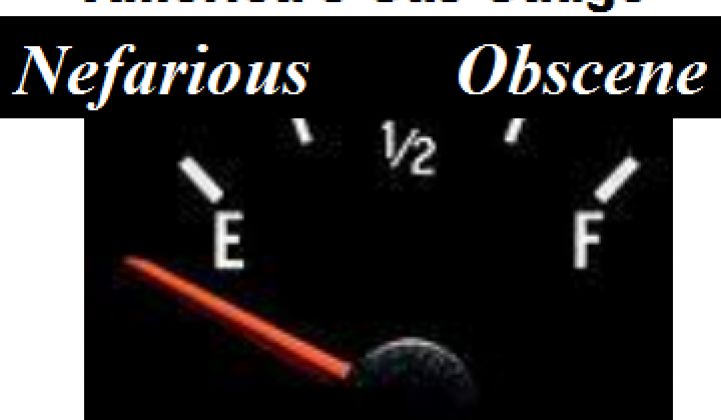With a barrel of oil now above $112 and rising, the five major oil companies are announcing Q1 2011 numbers this week and reports put profits at 40 percent above Q1 2010, despite a slowing of the economy.
Commentators from Saudi oil barons to Goldman Sachs to the AARP agree, according to Professor of Law Michael Greenberger, a former director of the Division of Trading and Markets, Commodity Futures and Trading Commission (CFTC), that oil market speculation is sending a false demand signal to the market, driving the per-barrel price far beyond the supply-demand-driven $75-to-$85 range and wreaking havoc with gasoline’s per-gallon price, as well.
It is putting a $40 premium on every barrel the oil companies sell and, according to Daniel J. Weiss, Senior Fellow and Director of Climate Strategy at the Center for American Progress (CAP), one-half to two-thirds of that premium is likely being reinvested in oil company stock, driving the stock price up and enriching shareholders, executives and the board in a classic case of the-rich-get-richer.
And, Weiss added, it is likely no more than one percent to seven percent of the money is being invested in “clean energy sources.”
Meanwhile, American commuters simmer in traffic and tremble at the pump. For every extra $30 per barrel, according to Weiss, drivers pay 75 cents per gallon more. For every $10 per barrel, the U.S. GDP drops 0.2 percent. With economic growth now at 1.8 percent, $40 per barrel could cost the nation a third of its expansion.
That, however, is just business as usual. The potential criminality starts with speculation.
“People with experience in these markets,” Greenberger said, referring to the oil commodities trade overseen by the CFTC, “believe that not only is the market awash with speculation that has its own impact without any criminal intent, but that there is fraud and manipulation that’s akin to the kind of conduct Enron used in 1991 to 2001 to drive up the price of electricity on the West Coast.”
The speculators’ nefarious intent, according to Greenberger, emerged on January 26, 2011. “On that date, the CFTC proposed a rule that was not only weak in terms of limiting speculation but clearly did not have the support of the majority of the commissioners.
“That’s the day oil started its dramatic increase,” Greenberger said, because the CFTC had signaled it would not support speculation limitations by exercising powers allowed by the Dodd-Frank reform bill. “That was Pearl Harbor for this market, Greenberger said. “The price took off because it was a signal to speculators that there was no cop on the beat.”
The remedy, CAP’s experts said, is oversight and enforcement.
It could begin, said Seth Hanlon, the Director of Fiscal Reform for CAP’s Doing What Works Project, with President Obama’s appointment in June of a “pro-consumer, anti-speculation” CFTC commissioner dedicated to reversing the events of January 26 by using Dodd-Frank powers.
Greenberger believes much stronger action is necessary. “Two weeks ago the Justice Department began its investigation” and, if the signal is sent that Justice is serious, “it will have an immediate impact in the price because the gamblers, just like the gamblers in the sub-prime market, will be driven away.”
Instead of the market-driven $75-to-$85 per barrel price, “we’re soon approaching another world record price,” Greenberger said. “It’s completely unjustified and could be stopped in its tracks if the Justice Department takes its investigation seriously.”
Either fix the markets in which the speculators are operating, Greenberger said, or they should be shut down. But he has, he said, “a high degree of confidence that within six months to a year, indictments can be handed down, and that would really pull the bottom out of the speculative fever and the price would go back down to the band it was in from the spring of 2009 through January of this year, that of $75 to $85.”
There are also remedies, Hanlon said, for the oil companies’ obscene profits. Besides what they are paying at the pump, he said, “American families are padding the oil companies’ profits with their tax dollars. There’s more than four billion in giveaways for the oil and gas industry embedded in the tax code.”
Such tax breaks are, Hanlon said, “relics” that are almost a century old. “If these provisions were ever needed, they certainly aren’t now when oil is not only a mature industry but the most profitable on earth.”
Doing so, Weiss said, will, according to authoritative studies, be “unlikely to have any impact” on gasoline or natural gas prices.
Hanlon highlighted three particular tax breaks he said should be reconsidered. “Oil companies will get $18 billion from the manufacturing tax deduction over the next decade. They’ll get $11 billion from percentage depletion allowances, special tax breaks only available to oil and gas. And they’ll get more than $12 billion from being able to write off so-called intangible drilling costs.”
Every indication is, the CAP experts agreed, that Congress will begin fighting over such oil and gas industry subsidies when they return from their spring recess. Even the “drill-baby-drill” side, he said, seems to recognize the public’s resentment of them.
“Last week, Speaker Boehner suggested a willingness to revisit these issues,” Hanlon said. “My interpretation is that he’s just simply tired of defending the indefensible.”



